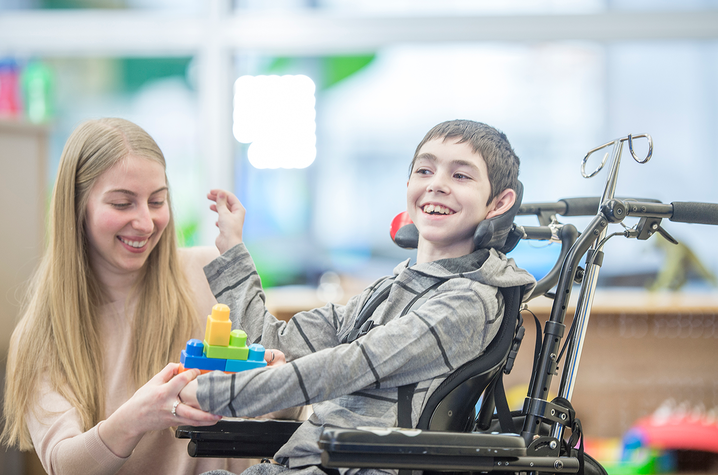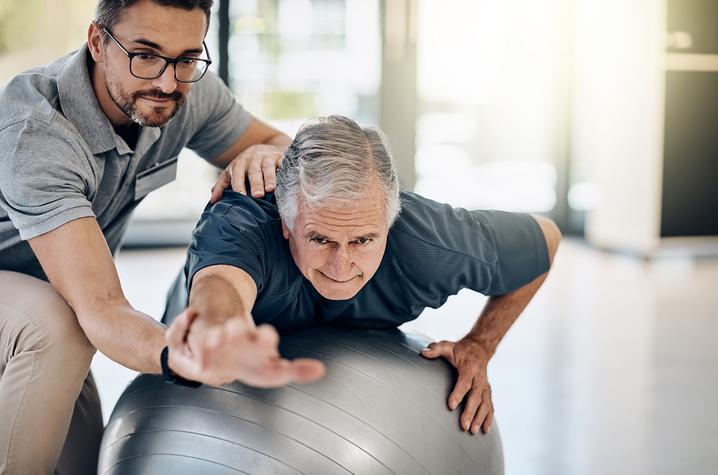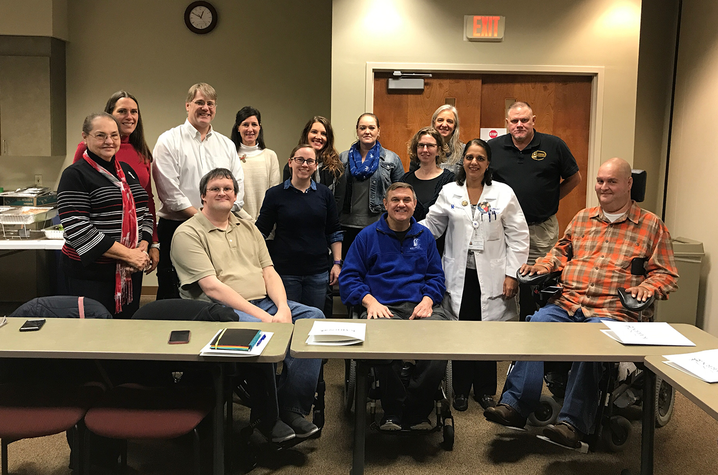KARRN Celebrates A Decade of Transforming Lives in Rural Kentucky
LEXINGTON, Ky. (Dec. 10, 2018) — The Kentucky Appalachian Rural Rehabilitation Network (KARRN) has spent the past decade investing in citizens of rural Kentucky who have experienced a neurological condition such as a spinal cord injury, stroke, or traumatic brain injury. Their collaborative team has transformed countless lives by helping survivors improve quality of life and reintegrate into their communities.
The idea for KARRN began as a question posed by founder Pat Kitzman, associate dean for research in the University of Kentucky College of Health Sciences, and KARRN co-director Beth Hunter, assistant professor in gerontology at the UK College of Public Health.
Patients are treated for a neurological injury and recover to the point of being sent home, many to a rural Kentucky community with limited services. What then? How do those with life-changing neurological conditions fare once home?
“We looked at the same problem from different perspectives,” Kitzman said. “As a patient, caregiver, or health care provider, what are the barriers they face and where could we step in to provide solutions?”
Survivors, caregivers, families, and friends forge bonds at Hazard support group
Tonya and Mark Kincaid learned about KARRN’s research and support programs after Mark experienced a stroke in 2009 at the age of 42. The Kincaids reside in Lecher County, an area in deep Eastern Kentucky, where access to health care services and support is minimal.
“Mark and Tonya are founding members of the monthly Hazard stroke support group and also participate in KARRN’s community research team,” Kitzman said.
“The members of our support group are like family,” Tonya said. “You share about each other’s experiences in the group and we all compare and learn from each other. It’s a safe place where we can grieve with those who are struggling emotionally and celebrate one another’s victories.”
“For example, we had a caregiver share a survivor’s accomplishment: He cut his own fingernails,” Tonya continued. “To a normal person, this wouldn’t be a cause for celebration. The reality is our loved ones struggle to do simple things every day. Combing their hair is a big deal. We share these achievements in our support group and they appreciate them.”
The Hazard support group is open to all people who may be impacted by a loved one or friend’s neurological injury. Caretakers are encouraged to participate even if their survivors do not come. Families and friends are always warmly welcomed and supported.
“Caregivers and families need the support just as much as the survivor,” Tonya said. “Mark’s mother was able to come and speak at the group. It was a release for her. She needed to stand up and say ‘My son had a stroke and he survived. He is alive, and he is happy. He struggles every day, but he does not give up.’”
Inspiring change from the hospital
“For us, the hospital was chaotic and emotional,” Tonya said. “A stroke patient may see ten doctors a day. For caregivers, especially family members, it can be impossible to remember every detail of a patient’s medical care during these initial stages.”
As part of KARRN’s community research team, the Kincaids give input on how health care professionals can help stroke survivors and caregivers in the wake of their diagnosis. One of their ideas—a notebook for the caregiver to record doctor’s names, medications, thoughts, questions they need to ask, details they need to know for care, etc.,—has already been implemented successfully.
“This notebook will help caregivers organize and compile their information and questions,” Tonya said. “Just recently, we were also asked to attend a meeting with the UK College of Design to share how the new KARRN center in Hazard can be properly designed and accessible for stroke survivors.”
Bridging gaps in access to care
In April 2011, Carolyn’s Wallace’s then 18-year-old son, Aaron, was the victim of a motor accident that left him with a severe brain injury. Aaron wasn’t expected to survive the night and spent a month in the ICU at UK Chandler Hospital.
The Wallaces call Madison County their home and reside between Berea and Paint Lick. Living in this rural area, they almost never traveled to Lexington. All that changed after Aaron’s accident.
“For the next four months, my husband and I practically lived in the hospital,” Carolyn said. “I slept in the ICU waiting room. Mike slept in our van in the parking garage. You never know when the doctors are ready to talk to you. It could be at any time.”
Aaron was then moved from Lexington to Louisville to attend a brain rehab center which put the Wallaces even farther from home. Eventually, he was accepted into the Kentucky Transitions program which brought him back to Lexington, and shortly after, to the services at KARRN.
“KARRN’s mission is to help people like us and I could definitely see the need to help others who didn’t have the programs like Kentucky Transitions,” Carolyn said. “I started attending KARRN events and meetings to learn more about how I could advocate for my son and other families going through similar situations.”
Getting Aaron’s voice back
As Aaron began to progress in his recovery, Carolyn wondered if he might be able to communicate again. After a conversation with Kitzman, they decided to try and implement speech-language interventions and music therapy through the UK College of Health Sciences Communications Sciences and Disorders (CSD) program.
“It was through Pat and KARRN that we first made this connection,” Carolyn said. “He introduced us to Jane Kleinert, professor emeritus in the CSD program, who fought hard for Aaron to be assessed properly. Through her work, and with the help of his other speech-language therapists, we found the right match with assistive technology that helped give my son his voice back. Now, Aaron is communicating again thanks to these interventions and the addition of music therapy. This type of care is only accessible to him at UK.”
Through the years, the Wallaces have stayed connected to KARRN as panel members for severe traumatic brain injuries at various events and conferences. Last year, they were responsible for a full-hour session at KARRN’s annual conference about how speech and music therapy work together.
“Aaron’s situation could be really isolating, but through KARRN and this process, he is viewed as a person with an opinion and a voice,” Carolyn said. “It’s helped him develop and become involved with people again. Because of KARRN we are not falling through the cracks. We are able to be engaged and involved.”







